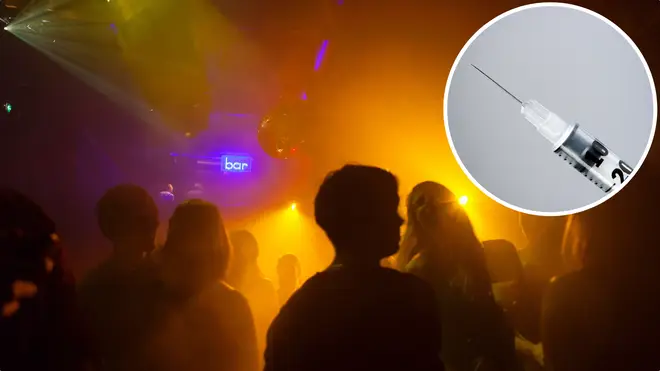
Ian Payne 4am - 7am
20 October 2021, 15:19 | Updated: 20 October 2021, 15:36

Police have been asked to urgently assess the scale of drink spiking at nightclubs and parties amid a rise in reports and claims some people have been drugged by injection.
Home Secretary Priti Patel has asked forces for an update after some said they had seen more spiking incidents in recent months, and there have been a number of reports in England, Scotland and Northern Ireland of women being injected with substances whilst on nights out - something that the National Union of Students (NUS) called "disgusting".
"It's absolutely disgusting that in the past few days a number of students have reported instances of women being spiked on nights out," said NUS president Larissa Kennedy.
Police chiefs have also been tasked by the Commons Home Affairs Committee to urgently provide more information on their assessment of the scale of the problem after reports of incidents in several parts of the UK.
Read more: 'They let her down': Woman 'killed by stalker' was failed by police, family say
Read more: Woman, 23, dies in hit-and-run in west London
Mair Howells, founder of I've Been Spiked, told LBC that injecting women was particularly "terrifying" because there was "no way" to protect yourself.
She added that, because victims need to get tested so soon after the incident, there are likely many cases that are not reported.
"With spiking it's a massive grey area," she told LBC's Shelagh Fogarty.
"Even though supposedly the reports aren't on the increase, it is difficult to get those reports through in the first place... it's difficult to access testing if you do believe you've been spiked, and if you don't have that testing then the police will not report the crime."

Caller shares heavy misogyny experienced by young women
Zara, a 19-year-old student, believes she was injected whilst on a night out in her university town of Nottingham.
Speaking to LBC, she said she remembered going into the nightclub and going to the toilet.
"From then on out I have no memory until when I got home and I was getting my phone charger," she said.
"When I woke up that next morning I was really confused because I had lost all my memory basically and I woke up with a really shooting pain in my leg, and I suspected it to be a spiking incident because I had heard about people who had been injected during nights out."
She added: "Even though I didn't want to admit it it seemed likely.
"I touched a part of my leg where the epicentre of the pain was and to my dismay there was a pinprick there."
Read more: Student shares harrowing experience of being 'spiked' with injection
Read more: Plain-clothed Met cops to video call colleagues when stopping lone women
Nottinghamshire Police said it has seen a rising number of reports of spiking over recent months and has arrested a man as part of a wider operation.
"Over the last few months we have seen an increase in reports where people believe that drugs may have been put in their drink," said Superintendent Kathryn Craner of Nottinghamshire Police.
"But we've also received a small number of reports where people are telling us, as Zara has, that this has been associated with a pain or a mark on a part of their body, scratching sensation, and as though they have been physically spiked."
The University of Nottingham said it was "extremely concerned" by the reports and was working with police and venues to "monitor, review and learn from incidents and experiences in the city centre".

'Women on the street don't feel safe and now politicians don't.'
Police Scotland is also looking into similar reports, with a spokesperson confirming they were investigating a "small number of reports" in Edinburgh, Dundee and Glasgow.
The spokesperson added they did not believe the incidents were linked.
Spiking drinks can lead to up to ten years in prison - or even higher if other offences like rape, robbery or another assault has taken place.
Read more: BTP fights decision to let cop who harassed lone jogger keep his job
Read more: Triple stabbing on London night bus leaves man in critical condition
Groups from more than 30 universities around the UK have joined an online campaign calling for the boycott of nightclubs, with campaigners seeking "tangible" changes to make them safer, such as covers/stoppers for drinks, better training for staff and more rigorous searches of clubbers.
A petition launched last week to make it a legal requirement for nightclubs to thoroughly search guests on entry has already gained more than 120,000 signatures.